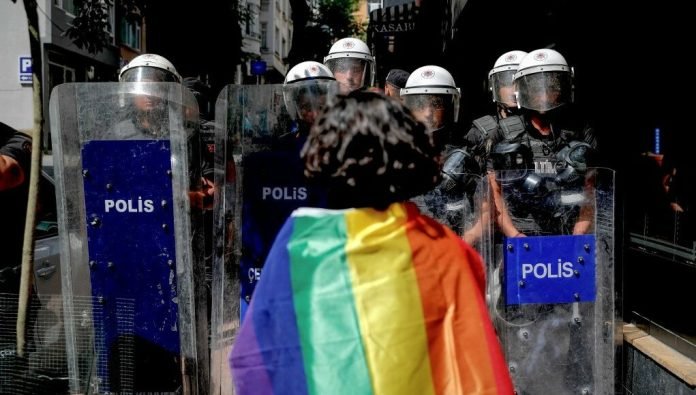Human Rights Watch on Wednesday called on Turkey’s government to immediately withdraw a draft law that would criminalize LGBT identities and gender-affirming care, warning it would mark one of the most serious rights rollbacks in decades.
The proposal, known as the 11th Judicial Package, would amend Article 225 of the Turkish Penal Code, which currently covers public indecency. Under the bill, anyone who “acts against their biological sex” or “encourages or praises such behavior” could face between one and three years in prison. Another article would criminalize engagement or marriage ceremonies between same-sex couples, carrying sentences of up to four years. The maximum penalty for sexual acts performed in public would also increase from one year to three.
The legislation could also affect digital and broadcast media, including streaming platforms that feature same-sex relationships in films or series. Such content could be prosecuted for “encouraging behavior contrary to public morals,” according to the bill’s wording.
The amendment could also allow criminal charges against civil‑society groups supporting sexual and gender minorities as well as media outlets and journalists reporting on gender‑identity or sexual‑orientation issues.
“Bringing criminal charges against people for their gender identity or sexual orientation is a profound violation of human dignity and amounts to state‑sanctioned oppression,” Hugh Williamson, Europe and Central Asia director at Human Rights Watch, said. “The Turkish government should drop plans to introduce these amendments, which blatantly violate international law and would leave LGBT people in constant fear of arrest and prosecution.”
Fifteen LGBT groups in Turkey have voiced serious concerns that the amendments threaten fundamental freedoms, equality before the law and participation in a democratic society.
HRW said that under international human rights law, governments have obligations to respect, protect and fulfill the rights of LGBT people and cannot invoke moral disapproval to justify denying those rights or discriminating against individuals, let alone bring criminal charges. The group said any restrictions must have a legitimate purpose and be established in law in a way that is precise, accessible and foreseeable, so people can understand what conduct might bring them into conflict with the law.
The draft also introduces new restrictions on gender reassignment procedures. The minimum age would rise from 18 to 25, and applicants would be required to be unmarried and obtain a medical board report from a health ministry–approved hospital confirming that the procedure is medically necessary for reasons of mental health. The report could only be issued after four evaluations conducted at least three months apart.
Unauthorized gender reassignment surgeries would be punishable by three to seven years in prison and heavy fines for medical professionals who perform them outside the legal framework.
In a statement the Turkish Medical Association emphasized that granting LGBT people access to necessary healthcare services should never be criminalized and highlighted that the proposal violates human rights.
Turkey’s ruling Justice and Development Party (AKP) has increasingly portrayed LGBT visibility as a threat to public morality and family values. Pride marches have been banned in major cities for years, and officials frequently describe LGBT advocacy as an attack on traditional norms. If enacted, the 11th Judicial Package would represent one of the most restrictive legal measures targeting LGBT individuals in Turkey in recent decades.
“The European Union and the Council of Europe and their member states should use all diplomatic and political channels to ensure this regressive draft law, which would put LGBT people in Turkey in grave danger, is abandoned,” Williamson said. “This is a defining test of Turkey’s respect for rule of law and fundamental democratic principles on rights and equality.”
Homosexuality is not illegal in Turkey, but homophobia is widespread. It is common for Turkish President Recep Tayyip Erdoğan and other politicians from his party to attack LGBTQ+ individuals and accuse them of perversion and ruining family values.
Meanwhile, Turkey was ranked 47th among 49 countries as regards the human rights of LGBTQ+ people in the 2025 edition of the Rainbow Index released in May by the International Lesbian, Gay, Bisexual, Trans and Intersex Association (ILGA), which placed Turkey among the bottom five countries for LGBTQ+ rights in Europe.















